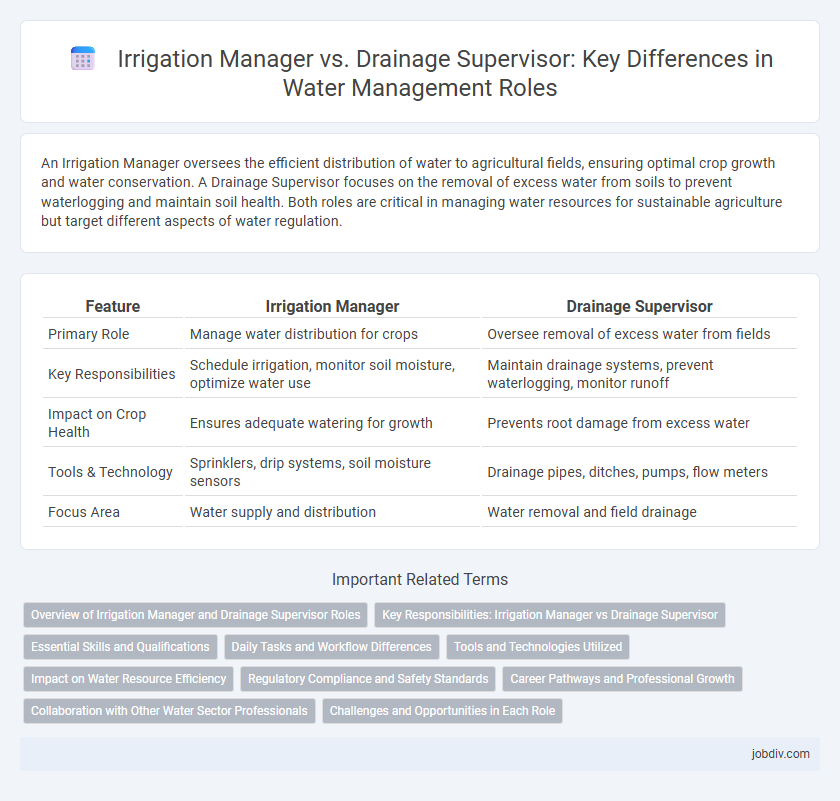An Irrigation Manager oversees the efficient distribution of water to agricultural fields, ensuring optimal crop growth and water conservation. A Drainage Supervisor focuses on the removal of excess water from soils to prevent waterlogging and maintain soil health. Both roles are critical in managing water resources for sustainable agriculture but target different aspects of water regulation.
Table of Comparison
| Feature | Irrigation Manager | Drainage Supervisor |
|---|---|---|
| Primary Role | Manage water distribution for crops | Oversee removal of excess water from fields |
| Key Responsibilities | Schedule irrigation, monitor soil moisture, optimize water use | Maintain drainage systems, prevent waterlogging, monitor runoff |
| Impact on Crop Health | Ensures adequate watering for growth | Prevents root damage from excess water |
| Tools & Technology | Sprinklers, drip systems, soil moisture sensors | Drainage pipes, ditches, pumps, flow meters |
| Focus Area | Water supply and distribution | Water removal and field drainage |
Overview of Irrigation Manager and Drainage Supervisor Roles
Irrigation Managers oversee the planning, implementation, and maintenance of water distribution systems to ensure efficient agricultural water use and crop production. Drainage Supervisors focus on managing water removal systems, preventing waterlogging, and maintaining soil health to optimize land productivity. Both roles are critical in sustainable water management, balancing supply and disposal to enhance agricultural outcomes.
Key Responsibilities: Irrigation Manager vs Drainage Supervisor
The Irrigation Manager oversees the planning, installation, and maintenance of water delivery systems to ensure efficient water distribution for agricultural and landscaping purposes. The Drainage Supervisor is responsible for managing drainage systems, preventing waterlogging, and controlling runoff to protect soil health and infrastructure. Both roles require expertise in hydrology and water management but focus on distinct aspects of water flow--irrigation for supply and drainage for removal.
Essential Skills and Qualifications
Irrigation Managers require expertise in hydrology, soil science, and system design to efficiently manage water distribution for agriculture, often holding certifications in irrigation technologies and project management. Drainage Supervisors focus on knowledge of drainage systems, groundwater control, and environmental regulations, with qualifications in civil engineering or environmental science to prevent waterlogging and soil erosion. Both roles demand strong analytical skills, familiarity with water management software, and a commitment to sustainable water use practices.
Daily Tasks and Workflow Differences
Irrigation Managers primarily oversee the scheduling, distribution, and maintenance of water systems to optimize crop hydration, ensuring efficient water use and preventing wastage. Drainage Supervisors focus on monitoring and managing the removal of excess water from fields, maintaining drainage infrastructure to prevent soil erosion and waterlogging. Both roles require daily inspections, but Irrigation Managers emphasize water delivery systems while Drainage Supervisors prioritize effective water runoff and soil health.
Tools and Technologies Utilized
Irrigation Managers utilize advanced scheduling software, soil moisture sensors, and automated valve controls to optimize water distribution and enhance crop yield. Drainage Supervisors rely on remote sensing technologies, flow monitoring systems, and GIS mapping tools to design and maintain efficient drainage networks that prevent soil saturation and waterlogging. Both roles integrate IoT devices and data analytics platforms to monitor real-time water usage and improve overall water management efficiency.
Impact on Water Resource Efficiency
Irrigation Managers optimize water distribution by implementing precise scheduling and advanced delivery systems, which enhances crop yield while minimizing water wastage. Drainage Supervisors focus on effective removal of excess water to prevent soil salinization and waterlogging, improving land usability and protecting groundwater quality. Both roles critically influence water resource efficiency by balancing supply and drainage to sustain agricultural productivity and environmental health.
Regulatory Compliance and Safety Standards
Irrigation Managers ensure regulatory compliance by monitoring water usage within agricultural guidelines, optimizing irrigation systems to meet water conservation laws, and maintaining adherence to local and federal safety standards. Drainage Supervisors focus on the implementation of drainage systems that prevent waterlogging and contamination, ensuring compliance with environmental regulations that govern runoff quality and erosion control. Both roles require rigorous adherence to safety protocols to protect workers and maintain sustainable water management practices.
Career Pathways and Professional Growth
Irrigation Managers specialize in designing and overseeing water distribution systems to optimize agricultural productivity, often progressing to roles in agricultural engineering or water resource management. Drainage Supervisors focus on managing water removal systems to prevent flooding and soil erosion, with career paths leading toward environmental consulting or civil engineering positions. Both roles offer opportunities for professional growth through certifications in hydrology, project management, and sustainable water practices.
Collaboration with Other Water Sector Professionals
Irrigation Managers coordinate closely with agronomists and hydrologists to optimize water distribution for crop efficiency, while Drainage Supervisors collaborate with environmental engineers and urban planners to mitigate waterlogging and prevent soil erosion. Effective teamwork among these professionals ensures integrated water resource management that supports sustainable agriculture and ecosystem health. Shared data platforms and joint field assessments enhance decision-making and operational effectiveness in managing water flow and quality.
Challenges and Opportunities in Each Role
Irrigation Managers face challenges in optimizing water distribution efficiency and minimizing water loss while ensuring crop health, with opportunities to implement smart irrigation technologies and precision agriculture practices. Drainage Supervisors encounter difficulties in managing excess water to prevent soil erosion and waterlogging, offering the chance to innovate with sustainable drainage systems and real-time monitoring tools. Both roles require adaptive strategies to balance water resources and enhance agricultural productivity amid climate variability.
Irrigation Manager vs Drainage Supervisor Infographic

 jobdiv.com
jobdiv.com